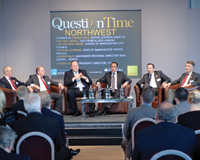The first Estates Gazette Question Time event was held in Manchester earlier this month. What did the city’s property elite ask our expert panel?
Will the national planning policy framework deliver more growth? And does anyone really understand it?
Sir Richard Leese, leader of Manchester city council
“I’m not sure government is clear about what it wants to do and what its objectives are. They’ve got a strapline, something like, they’re taking 600 pages of planning guidance and turning it into 60 and that will make everything simpler. But if by making it into 60 pages, it becomes unclear, you’re better off having 600 pages that spell it out.
“The planning reform started off effectively as being aimed at allowing Conservative shire districts to stop development. It wasn’t designed as a pro-development thing at all. It now appears to be trying to look both ways at once, to be both pro-development and also give local freedom to prevent development if that’s what local authorities or local neighbourhoods want to do.
“What the development industry wants is certainty. I suspect we are going to have less certainty than in the past and I don’t think that’s going to be good for development.”
Michael Ingall, CEO, Allied London
“You only have problems with planning if what you’re proposing isn’t appropriate and developers do a lot of things that aren’t appropriate. They think they can turn that piece of land into something that isn’t actually needed. If you follow the local development frameworks, if you follow planning policy, you do what’s appropriate. I’ve never had an issue with planning.”
What are Manchester city council’s top three priorities?
Sir Richard Leese
“Support for the most vulnerable people within our society is always going to be number-one priority. On the economy, there are only two priorities. One is to create more jobs, and two is to get people into those jobs. It is about supporting the private sector in creating jobs and it is about investing in infrastructure.
“There are a large number of major projects that we are working on in partnership with the private sector, which from their point of view, is about making money. From our point of view, it’s about creating jobs.”
Is it time to drop the artifice of Salford being separate from Manchester if we are to attract greater inward and international investment?
Patrick Joynson, head of Savills’ Manchester office
“I think it’s more of a bigger deal for people who work in the region. I think outside greater Manchester and the North West, we’re all seen as Manchester to some extent. When people refer to the BBC move up north, some of them refer to moving up to Salford. A lot of them say, of course, it’s moved up to Manchester. So I think the separation is blurring.”
Peter Copley, property director, ITV
“When the BBC was looking to move, originally it was the North West and then it was the Greater Manchester area.
“Manchester is definitely the brand, so I think people at the BBC, when they’re moving up, and those who have decided not to move up, they were thinking about Manchester, not specifically about Salford.
“I think you’re lucky. You’ve got two innovative authorities in Manchester and Salford, and I think Salford is learning some lessons from Manchester. Is healthy competition a good thing? From a tenant’s point of view, probably.”
Are the banks really open for business?
Michael Ingall
“In my view, 2004-08 was an absolute bubble. If anybody thought that was actually real, they were so wrong. The value of assets was only there due to one thing and that was very cheap debt, and lots of it.
“The banks are open for the sort of business they did in 2001-02, which is probably what debt ought to be.
Derek Bald, regional director of real estate for Santander in the North
“I do get asked this question everywhere I go, are the banks open? And taking up Mike’s point, we’re back to fundamentals. There’s debt available out there, but it’s 60-65%, if you’re really lucky, so there’s a big chunk of equity that has to come in for any project that we’re looking to fund. We are selective in where we put our money and it’s back to fundamentals. It’s looking at the right property and the right location for the right people.”
The next Estates Gazette Question Time event takes place on 29 November in Birmingham. For more, go to www.estatesgazette.com/questiontime











